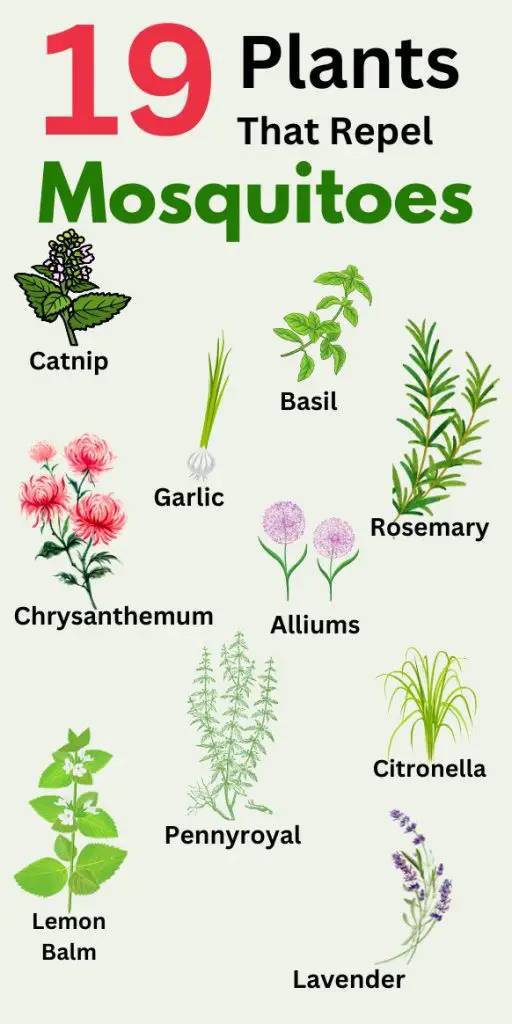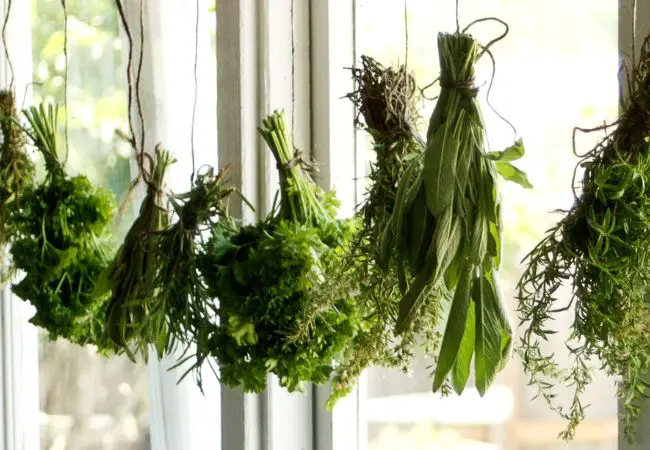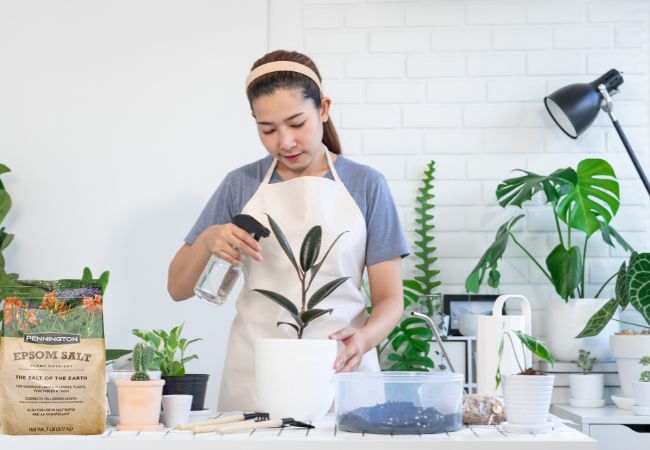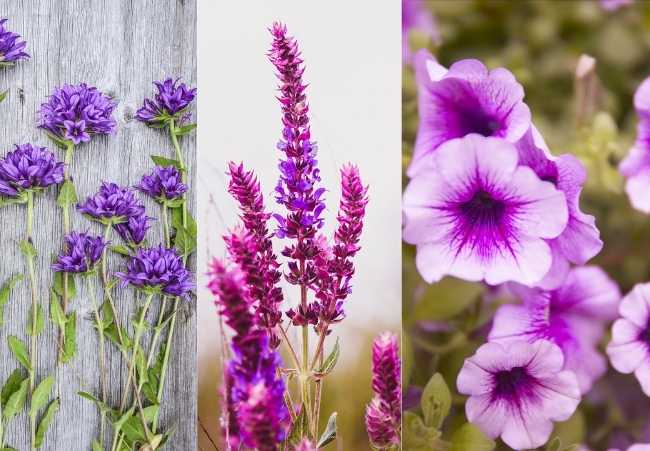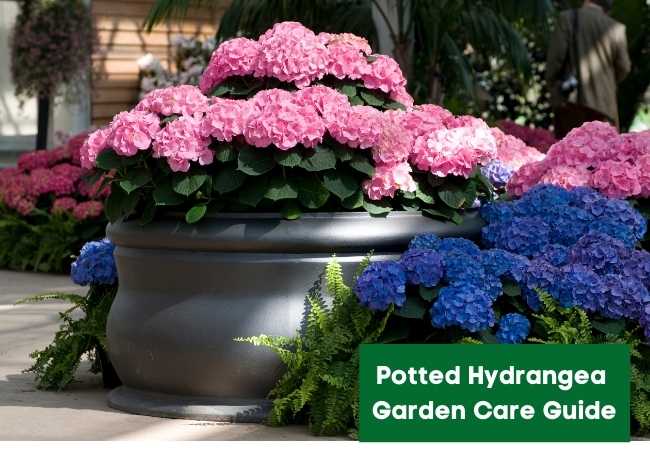19 Plants That Repel Mosquitoes Naturally
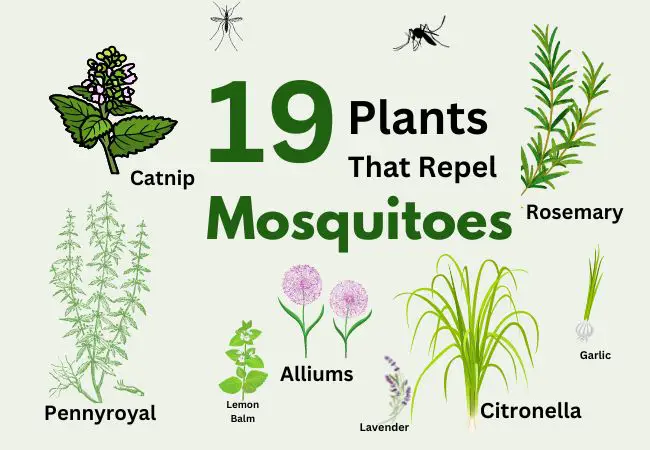
The best plants that repel mosquitoes naturally that can be grown in gardens as well as in pots. I find mosquitos to be pesky and irritating insects. While many people turn to chemical insecticides to ward off these pests, there are natural and eco-friendly alternatives available.
Plants That Repel Mosquitoes Naturally
Plants have been used for centuries to repel insects, including mosquitos, and they can be an effective and safe solution. In this post, I will explore 19 different plants that can repel mosquitoes, and how to use them to create a more mosquito-free environment.
Citronella As A Mosquito Repellant
Citronella is a common plant that is often used in candles, sprays, and other products as a natural insect repellent. The plant contains citronellol and geraniol, two chemicals that are known to repel mosquitoes.
To use citronella, you can plant it in your garden, or use it in candles, sprays, or essential oils. Be sure to use pure essential oil, as synthetic versions may not be as effective.
Lavender As a Mosquito Repellant
Lavender is a beautiful and fragrant plant that also happens to repel mosquitos. The plant contains linalool, which is a natural insect repellent.
Lavender is easy to grow and can be used in a variety of ways, including as a decorative plant, in essential oils, or even in sachets for your closet.
Marigold For Repelling Mosquitoes
Marigolds are a beautiful and hardy flower that is also one of the well know plants that repel mosquitoes. The plant contains pyrethrum, which is a natural insecticide that is commonly used in commercial bug sprays.
Marigolds are easy to grow and can be planted in your garden or in containers. They also come in a variety of colors, so they can add a pop of color to your outdoor space.
Lemon Balm for Repelling Mosquitoes
Lemon balm is a citrus-scented herb that is also known for its insect-repelling properties. The plant contains citronellal, which is a natural insecticide.
Lemon balm is easy to grow and can be used in a variety of ways, including as a decorative plant, in cooking, or in essential oils.
Basil For Repelling Mosquitoes
Basil is a popular herb that is often used in cooking, but it also has insect-repelling properties. The plant contains eugenol, which is a natural insecticide.
Basil is easy to grow and can be used in a variety of ways, including as a decorative plant or in cooking. You can also crush the leaves and rub them on your skin as a natural mosquito repellent.
Catnip for Repelling Mosquitoes
Catnip is a plant that is often associated with cats, but it is also an effective mosquito repellent. The plant contains nepetalactone, which is a natural insect repellent.
Catnip is easy to grow and can be planted in your garden or in containers. It is also a great plant for attracting pollinators like bees and butterflies.
Peppermint for Repelling Mosquitoes
Peppermint is a refreshing and invigorating herb that is also a natural mosquito repellent. The plant contains menthol, which is a natural insecticide.
Peppermint is easy to grow and can be used in a variety of ways, including as a decorative plant, in cooking, or in essential oils.
Garlic for Repelling Mosquitoes
Garlic is a pungent herb that is often used in cooking, but it also has mosquito-repelling properties. The plant contains allicin, which is a natural insecticide.
Garlic is easy to grow and can be used in a variety of ways, including as a decorative plant, in cooking, or even crushed and rubbed on your skin as a natural mosquito repellent.
Rosemary for Repelling Mosquitoes
Rosemary is a fragrant herb that is commonly used in cooking, but it also has insect-repelling properties. The plant contains camphor, which is a natural insecticide.
Rosemary is easy to grow and can be used in a variety of ways, including as a decorative plant, in cooking, or in essential oils.
Lemongrass for Repelling Mosquitoes
Lemongrass is a tall grass that is often used in cooking, but it also has mosquito-repelling properties. The plant contains citronella, which is a natural insecticide.
Lemongrass is easy to grow and can be used in a variety of ways, including as a decorative plant or in essential oils.
Mint for Repelling Mosquitoes
Mint is a refreshing herb that is often used in cooking, but it also has insect-repelling properties. The plant contains menthol, which is a natural insecticide.
Mint is easy to grow and can be used in a variety of ways, including as a decorative plant, in cooking, or in essential oils.
Sage for Repelling Mosquitoes
Sage is a herb that is commonly used in cooking, but it also has mosquito-repelling properties. The plant contains thujone, which is a natural insecticide.
Sage is easy to grow and can be used in a variety of ways, including as a decorative plant, in cooking, or in essential oils.
Pennyroyal for Repelling Mosquitoes
Pennyroyal is a member of the mint family and has strong insect-repelling properties. The plant contains pulegone, which is a natural insecticide.
Pennyroyal is easy to grow and can be used in a variety of ways, including as a decorative plant or in essential oils. However, it is important to note that pennyroyal can be toxic if ingested, so it should not be consumed or used on the skin.
Lantana for RepellingMosquitoes
Lantana is a colorful flower that is also known for its insect-repelling properties. The plant contains lantadene, which is a natural insecticide.
Lantana is easy to grow and can be planted in your garden or in containers. It is also a great plant for attracting pollinators like bees and butterflies.
Chrysanthemum for Repelling Mosquitoes
Chrysanthemums are beautiful flowers that are also a natural insecticide. The plant contains pyrethrum, which is commonly used in commercial bug sprays.
Chrysanthemums are easy to grow and can be planted in your garden or in containers. They also come in a variety of colors, so they can add a pop of color to your outdoor space.
Eucalyptus as a Mosquito Repellant
Eucalyptus is a fragrant tree that is also known for its insect-repelling properties. The plant contains cineole, which is a natural insecticide.
Eucalyptus is easy to grow and can be used in a variety of ways, including as a decorative plant or in essential oils.
Alliums as a Mosquito Repellant
Alliums, which include onions, garlic, and chives, are a group of plants that are also effective at repelling mosquitos.
The plants contain allicin, which is a natural insecticide. Alliums are easy to grow and can be used in a variety of ways, including in cooking or as a decorative plant.
Bay Leaves for Repelling Mosquitoes
Bay leaves are a fragrant herb that is often used in cooking, but it also has mosquito-repelling properties. The plant contains eucalyptol, which is a natural insecticide.
Bay leaves are easy to grow and can be used in a variety of ways, including as a decorative plant or in cooking.
Using Plants to Repel Mosquitoes
There are many plants that repel mosquitoes and provide an eco-friendly and safe alternative to chemical insecticides.
Incorporating these plants into your outdoor space can not only help to keep mosquitos away but also add beauty and fragrance to your surroundings.
It is important to note that while these plants can be effective at repelling mosquitos, they may not provide complete protection.
It is still important to take additional measures, such as wearing protective clothing and using mosquito repellent, especially in areas with a high mosquito population or where mosquito-borne illnesses are prevalent.
I hope this post on plants that repel mosquitoes naturally was helpful. If you love plants like me, don’t forget to follow me on Multigardening Pinterest for more awesome posts.
